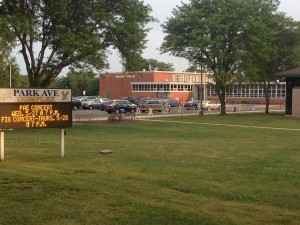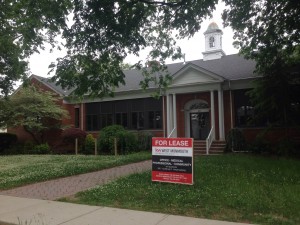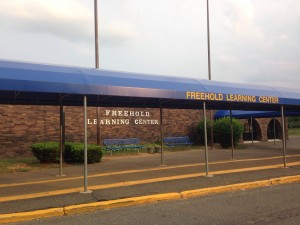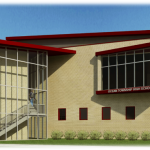Rejected by voters twice, Freehold Boro Board of Ed moves to borrow $33 million for school construction
Superintendent of Schools: Referendum would have passed if illegals could vote
Residents are asked to comment after voting twice
By Caitlin Brown, Contributor
Despite two rejections by voters, the Freehold Borough School District has decided to move forward with plans to force taxpayers to borrow $33  million for the financing of state of the art construction and renovation to the district’s current schools, in order to cope with the influx of undocumented residents to the borough and the subsequent overcrowding of 500 additional students to the school district.
million for the financing of state of the art construction and renovation to the district’s current schools, in order to cope with the influx of undocumented residents to the borough and the subsequent overcrowding of 500 additional students to the school district.
The Board of Education has decided to appeal to the New Jersey Comissioner of Education for the appropriation and authorization of the school bonds, but are required by State Department of Education guidelines to provide a public comment period for residents, open until June 8.
The referendum in dispute was first rejected in September and again in December, by residents who balked at the bond referendum’s total cost of $32,902,400. The proposal calls for bonds of $22,091,500 for the construction of additions to the Park Avenue Elementary and Intermediate School, including: an additional cafeteria; an additional gymnasium; four new classrooms; an additional girls’ locker room; renovations to five existing classrooms; renovations to one of the two boys’ locker rooms; and a new library/media room, as a result of the existing library having been converted due to lack of space elsewhere into cubicles for special needs and ESL learning, according to the district’s superintendent, Rocco Tomazic. A total of $10,633,300 is also being sought for the building of 13 pre-K and kindergarten classrooms at the Freehold Learning Center, as well as renovations to the cafeteria and a new kitchen receiving area, according to the district’s referendum schematic plans.
At the heart of this current debate between the school system and residents is something that Freehold Borough has long struggled with finding effective solutions for: illegal immigration. According to the 2010 census, 42.9% of the borough’s population and 68% of the district’s student population is Hispanic. Estimates are unclear, however, on how many people are illegal residents, as the law allows for foreign born residents to be included in census data as well as children to be provided public education, but does not require statuses of legality to be disclosed.
Tomazic, speaking on behalf of the Board of Education, says that despite lack of definitive numbers, the district believes that it is safe to assume a significant portion of these Hispanic students have parents who could not vote in the disputed referendum due to lack of citizenship.
“You have students here who may not have had parents that were able to come in and say, ‘I want this referendum passed; I want to provide the best education possible for my child and therefore, I approve of these plans,” Tomazic said.
With a $33 million proposal cost, Tomazic says the district was not surprised with the voter results. When speaking with More Monmouth Musings, the superintendent recalled a recent run-in with a frustrated resident at a borough event. According to Tomazic, the resident “stuck her finger” in his face, stating, “Why should I have my taxes increased for those people? They don’t belong here, and I shouldn’t have to pay for them”.
“We all know who ‘those people’ refer to,” Tomazic says. “But I am an upapologetic advocate for these students, who- whether their parents are illegal immigrants and pay taxes in the borough or not- have the right to an education by law.
“If [the district] cannot convince the voters to land on the right side of this issue, then we have a responsibility as educators to go to the state to accomplish what needs to be done to provide the proper education for each of these students.”
In the referendum, the Board of Education states that it has “determined that the school improvements are necessary… to provide a thorough and efficient education” to its students. Therefore, despite the referendum being rejected twice by voters, the Board of Education has determined that it has no choice but to “comply with the State of New Jersey’s constitutional mandate of a thorough and efficient education for each of its students” by appealing to the New Jersey Commissioner of Education to request the legislature appropriate funds and authorize school bonds for construction because the district “lack[s] adequate school facilities.”
However, there are voters speaking out against the board’s decisions who are adament that illegal immigration is not the only issue.
Long-time borough resident Gianna Dell’Omo stated in an editorial submitted to MoreMonmouthMusings that although “no one can deny that the overcrowding has been and remains an issue which requires an acceptable solution… the conflict arises as to whether the solution should cost the Freehold Borough taxpayers close to $33 million”.
“When there is a need for additional classroom space, it is not cost effective to spend money on the creation of an additional gymnasium which requires special flooring, a vaulted ceiling, bleachers and locker rooms, if there is a good chance it could be used as a classroom anyway,” Dell’Omo said.
 Dell’Omo is a local realtor who has submitted at recent Board of Education meetings information regarding local properties that she feels would be significantly more cost effective, including a commercial property located at 32 Broad Street, which has been listed for sale at $1.85 million.
Dell’Omo is a local realtor who has submitted at recent Board of Education meetings information regarding local properties that she feels would be significantly more cost effective, including a commercial property located at 32 Broad Street, which has been listed for sale at $1.85 million.
“The $1.85 million property is 15,000 square feet and zoned for day care facility use. The Board’s schematic plan for the Freehold Learning Center indicates construction of 13 classrooms totaling 9900 square feet,” Dell’Omo explains. “The preliminary estimate for this construction is $10,633,300. The purchase and renovation of the 32 Broad Street facility should certainly reduce this proposal by a significant amount, not to mention provide even more space, and that should be the focus of this proposal, if overcrowding is the issue.”
Tomazic denies the purchase of the suggested property as being a solution for the district’s overcrowding. “We looked at this building last year and the district determined that it was not a viable solution for a few reasons. For one, there still wouldn’t be enough room for all of the students- it leaves approximately 100 students without a classroom, and therefore, additional space would still need to be provided.
“Besides the limited space, the bottom floor of the building was deemed not up to standards, and would require renovation. In addition, with a new school [the district] would need to hire more staff members, including a principal, teachers, and a nurse. When you add these total costs together, it’s not cost effective and does not solve the problem in its entirety,” Tomazic said.
Dell’Omo believes that a more viable solution to student overcrowding would be to alleviate the expense by concentrating on the using the funding strictly for construction of new classrooms, rather than the other amenities the Board’s plan proposes.
“The addition of locker rooms, a second cafeteria, a second gym, and a new lobby has no direct correlation for the Freehold Borough School District to provide a ‘thorough and efficient education’,” she said.
Besides disputes over the construction plan specifics, Dell’Omo and other voters have cited higher property taxes and concerns over town marketability as the main reason to reject the $32.9 million proposal.
“I realize that the Board’s intention is to create an improved school facility to attract families with children to the town’s school system,” Dell’Omo said. “But this method is basically putting the cart before the horse. In order to attract middle class families with children to owner-occupy the residences in town, the Borough must first offer an affordable market for those homeowners to consider making the investment. Creating large debt, which results in an increased property tax bill, negatively affects marketability.”
A search of the real estate market in Freehold Borough reveals homes that are listed at “an average of $50,000 less than assessed value, with 20% in foreclosure”, according to Dell’Omo. Investors then take advantage of the flailing market by turning the property into rentals for earned income revenue.
The residents, however, are led to believe that by placing more money into the system, the schools will receive a higher rating and attract more middle class families into the community. But the fact is, that with higher property taxes in a depreciating market, the only residents the town will attract are more renters. To date, most of the homes on the market in the Borough are listed at an average of $50,000 less than assessed value, 20% of which are in foreclosure. Foreclosed properties are purchased by investors, who then rent the properties for earned income revenue. Although property owners pay taxes to the borough, individual families renting these homes do not. What follows, inevitably, higher percentages of rental properties will result in not only lower market value for homes throughout the borough, but also an influx of students to the school system that come from renting families not contributing to the tax system- something residents like Dell’Omo feel is the issue that most needs addressing.
class families into the community. But the fact is, that with higher property taxes in a depreciating market, the only residents the town will attract are more renters. To date, most of the homes on the market in the Borough are listed at an average of $50,000 less than assessed value, 20% of which are in foreclosure. Foreclosed properties are purchased by investors, who then rent the properties for earned income revenue. Although property owners pay taxes to the borough, individual families renting these homes do not. What follows, inevitably, higher percentages of rental properties will result in not only lower market value for homes throughout the borough, but also an influx of students to the school system that come from renting families not contributing to the tax system- something residents like Dell’Omo feel is the issue that most needs addressing.
“If the Borough continues to base school taxes on the assessed value of the property, the housing market will decline in that the taxes will exceed the marketability or value of the property, especially in our current depleted economic state, and as a result, more rental properties will continue to emerge,” Dell’Omo said.
School and property taxes in Freehold Borough were already raised according to the 2014/2015 preliminary tax bill, meaning a homeowner of a property assessed at $250,000 can expect an approximate 13% school tax increase, should the $33 million proposal pass.
Residents have until June 8 to submit comments, after which time, the New Jersey Commissioner of Education will then consider the Board of Education’s appeal. Although the Department of Education declined comments regarding the Freehold Borough School District’s appeal, citing pending legal issues, the department stated that appeals to the state commissioner are, historically, “very uncommon”.
NJDOE Deputy Press Secretary David Saenz, Jr., said that there have only been two other similar cases- in 2003 and 2008- that have come before the NJDOE commissioners in over ten years. According to Saenz, in the 2003 decision, the commissioner at the time sided with voters in declining the issuance of bonds based on “insufficient evidence” to warrant a directive for funds.
The burden is now, then, placed on voters to provide sufficient evidence in favor of declining the $33 million proposal to the commissioner. Members of the public must submit an original and a copy of such comments, which cannot exceed 10 pages in length, to the following office, no later than the end of the business day on June 8:
New Jersey Commissioner of Education
c/o Bureau of Controversies and Disputes
100 Riverview Plaza
P.O. Box 500
Trenton, NJ 08625-0500
A third copy of the written comments must be filed concurrently with the Secretary of the Board, no later than the end of the business day on June 8, at the following address:
Mr. Joseph Howe, Secretary
Freehold Borough School District
280 Park Ave.
Freehold, NJ 07728
For more information, visit the Board of Education’s online public notice at: http://www.freeholdboro.k12.nj.us/cms/lib6/NJ01001089/Centricity/Domain/1/Press%20Release%20-%20Freehold%20Boro%20Public%20Comment.pdf











Not taking sides here but just wondering if there is actual evidence to document the claim in the first paragraph that the cause of school overcrowding is because of “the influx of undocumented residents to the borough and the subsequent overcrowding of 500 additional students to the school district. ”
In the link to the article below, the Cesa director noted in an interview last August that to her knowledge there has been only one refugee child, a 16 year old boy, that has arrived in Freehold from Central America since the first of the year (2014) and that there is no parade of children arriving at a rate of one per day.
http://www.moremonmouthmusings.net/2014/08/07/casa-freehold-director-there-is-no-influx-of-central-american-youth-in-freehold/
Not really sure why the Superintendent had to “recall an event” where a resident pointing a finger/making an opinionated comment was necessary. It leads a reader to believe that resident (and most taxpaying residents) are racist. Completely unnecessary!
It is admirable that the Superintendent is an unapologetic advocate for the students – but it is a disgrace for him to insult Boro homeowners with his generalizations based on one person’s opinion at a meeting. Those of us who choose to live in the Boro, do so for many reasons, including cultural diversity – and we care about the education of ALL the Boro children. And many property owners who are against the increased taxes are ethnically diverse families as well. But we also have concerns about increasing property taxes, and future property values – at some point we won’t be able to afford to live in our own homes. The State simply needs to allocate enough money to our District to sufficiently provide our student population with the educational environment and services they need to succeed.
Tomazic get the focus off of the illegals they are only one part of the issue, you are the problem … run these public schools better, more efficiently, more effectively with the budget that is there. Our tax payer money is not yours to squander. For you think it is your money, you have no accountability with others money do you. No where do you account for yourself and your abilities to be a true business thinking accountable individual. Just put the screws to the Tax Payers and blame it on the in flux of illegals… great job! Own the position you signed up for or resigned. Typical goverment employee … you suck!
The real problem, as it has been for years, is the funding methodology for our schools in this state.
The property tax is the worst way to fund school education. It forces our seniors out of their homes, and angers many taxpayers who have no children in the system, which creates the no votes that do occur.
The second problem is that there are too many school systems in each county, creating a serious inefficiency in the expenditure of funds with the duplication of positions.
I would first suggest consolidation of school districts into one, efficiently run, county wide district; this would eliminate numerous and duplicative positions – ie- superintendents, business administrators and their staffs.
I would then suggest a complete overhaul in the funding methodology of the county school district – with parents of children attending the public school paying a share of the costs (after all, those parents who now send their children to private school must pay the entire cost for their children as well as pay the property tax on their homes for the public school system.)
There would need to be another method of taxation for others to pay their portion of the educational costs (residents and businesses located in Monmouth County), with appropriate credits for seniors living on fixed incomes (who have already borne much of the financial burden of local school costs). Whether that should be an income tax on residents and property tax on businesses, or something else, would need to be studied and the most effective and appropriate method chosen.
There is also a third point to be discussed.
A major effort to provide competition in educational services must be made. We cannot let this continue with powerful unions holding the children’s education hostage to the demands of the union leadership.
A county wide sytem, as mentioned above, would also provide the taxpayers greater leverage in negotiating with the unions in terms of salaries and benefits – the major costs in running an educational system. Competition in providing educational services can also provide more accountability to the parents, their children, and the taxpayers.
One final point – the attempt to blame the problem on immigrant children is usually an attempt by some to have a scapegoat for the economic problems they face. Look in the mirror and you may see where the real problems are. It’s time for a real change in how we educate our young – the very future of our country. No more inefficient and ineffective methodologies – they must be replaced by creative solutions, not more of the same nonsense which has only created more problems and divisions within the communities.
The headline “Superintendent of Schools: Referendum would have passed if illegals could vote” is very misleading, unfair, deceptive and disingenuous”. He did not say that. This is what he said, “Tomazic, speaking on behalf of the Board of Education, says that despite lack of definitive numbers, the district believes that it is safe to assume a significant portion of these Hispanic students have parents who could not vote in the disputed referendum due to lack of citizenship.” The operative word here is “lack of citizenship” not legality of status. Millions of immigrants are here legally but do not have citizenship, and thousands of legal immigrants live in Freehold, pay taxes in Freehold and the state, but do not have citizenship and cannot vote. These are the people the superintendent was refering to. Just because an immigrant is here legally but doesn’t have citizenship and can’t vote does not mean their kids should be denied a thorough and efficient education as the state constitution requires. I really think this post should be re-edited to accurately state what the superintendent actually said, not what some right wing xenophobic bigot, who assumes every noncitizen immigrant is illegal, thinks that is what he said.
you ought to take a ride into the Boro, some nice warm evening: the reality is that the demographic of that town has in fact changed, to where one might think he is across the southern border, now.. estimates are that up to 40% of those living there are now Hispanic/ Latino, etc.. and yes, many are”undocumented,” and yes, many have school- aged children, and yes, the district is charged with trying to educate everyone..the law says they are all entitled to be educated- the realty is,that fewer taxpayers are paying the bill. However one feels about all aspects of what has become our full- blown, national immigration problem, the multi- faceted impact is,of course,felt much more strongly, in a town the size of little Freehold Boro..